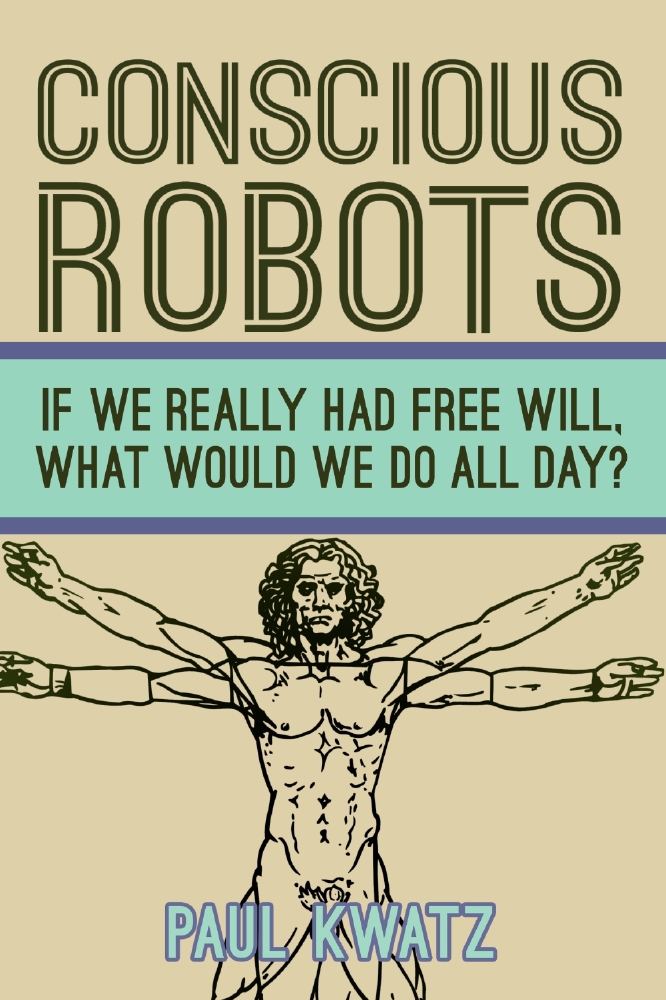By Paul Kwatz, author of Conscious Robots

Conscious Robots
As we’re growing up, most of us have to grapple with the challenge of not being as good-looking as we’d like to be. We look with envy at the cheerleaders and the hunks - we’d like to look like them and we’d love to date them. But soon we realise it’s never going to happen - our parents just didn’t pass on the right genes.
But that’s ok. If we really want to look great, we can still eat right, get down the gym and have the hottest body on the planet - that’s our free choice, nothing to do with the inheritance lottery. “You can’t help being ugly, but it’s your own fault if you’re fat.”
But it turns out this isn’t the case.
To understand why it’s not your fault if you’re fat, consider how you decide whether to go for a run or sit on the sofa eating donuts: you weigh up how much pain or pleasure you’re going to get from these options. If you estimate that the pleasure you’ll get from losing weight will exceed the pain of running... then you run. If your brain tells you that the pleasure of eating the donuts will exceed the guilt... then you tuck straight in.
But what controls how much pain or pleasure we get from something? We know we can’t control it ourselves, otherwise we’d simply choose to feel great about being fat and ugly. There seems to be something going on in our brains that is beyond our conscious control.
In turns out that how we feel is determined by evolution: we’re evolved to maximise the survival chances of our genes: first we have to eat (that’s why we love donuts) then we have to mate with the highest quality partner we can find (that’s why we want to be good-looking) and then we want our genes to survive - that’s why we care so much about what happens to our kids. And all this is controlled by pain and pleasure. Our conscious minds make choices based on pain/pleasure metrics created in our non-conscious minds - and our non-conscious minds are programmed by our genes. We have no more control over our determination to be thin than we do over our eye colour: the only difference is that because the control passes through our conscious minds, we feel like it’s our own fault we’re fat.
But here’s the really good news: it doesn’t matter that we’re not in control of our choices, because we wouldn’t be any happier if we were thin.
Evolution had to build a non-conscious brain that was capable of incentivising our conscious minds to make the “right” decisions (the ones that would maximise the survival chances of our genes) - regardless of what situation we found ourselves in. Our great grandparents didn’t have mobile phones, TVs, or even toilets inside their houses - but they didn’t lead the miserable life that we think we would personally experience if these things were taken from us now. Our non-conscious minds evolved to give us pleasure only if our lives get better than they were yesterday or last week. And to give us pain only if our lives get worse than we were expecting them to turn out.
That’s why billionaires still work ridiculous hours and wealthy movie stars still try to win another Oscar - their brains just won’t let them be happy with what they’ve got.
And it’s also why, once your brain has come to terms with the idea of you being fat and unattractive, it then makes you feel just as good as all those sweaty gym-rats.
And if that thought makes you happy, don’t get too excited. The happy feeling won’t last.
‘Conscious Robots: If We Really Had Free Will, What Would We Do All Day’ is out now in print, published by Peacock’s Tail Publishing and priced £4.99 in paperback and £2.99 as an eBook. Visit www.consciousrobots.com

